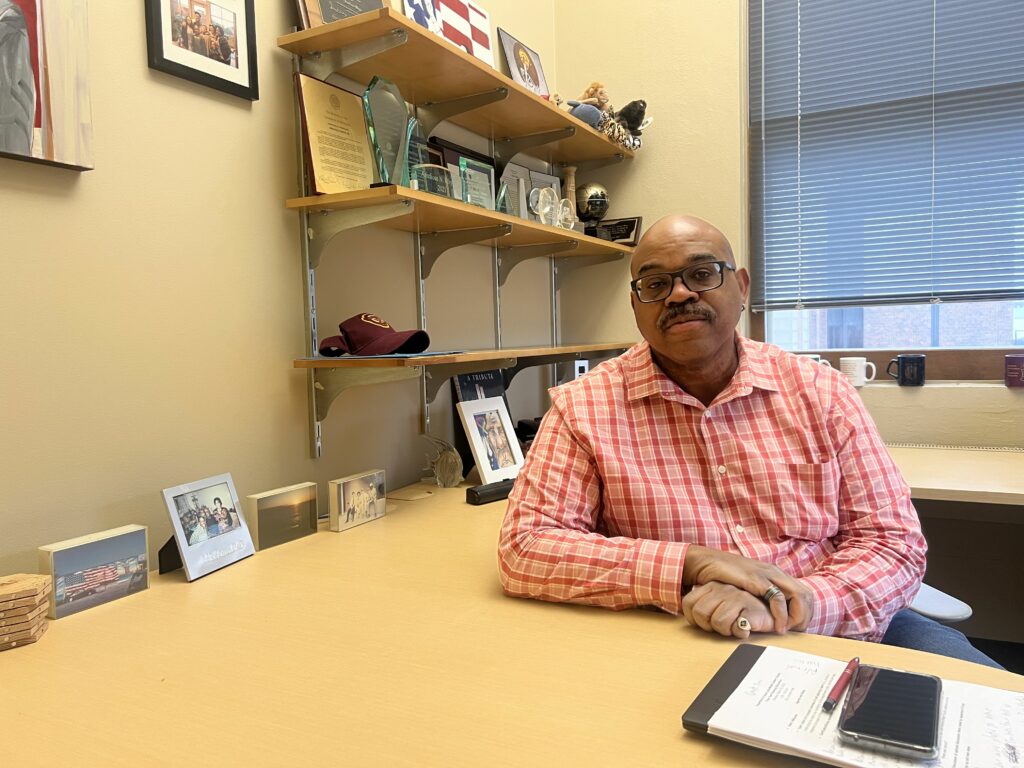First-Gen DEI administrator’s impact felt throughout campus community
Whyte’s intersecting identities have led to a life and career committed to education, inclusivity and student achievement.

By Ben Wagner
When Amelious Whyte arrived at the University of Minnesota in 1990, he thought he was going to complete his master’s degree in public affairs and move on elsewhere — to politics or maybe work in government as a city manager.
But after an assistantship with the vice president of student affairs, Whyte was hired for a full-time position in that office in 1993. He’s been working at the university ever since.
“Working in higher ed was accidental,” Whyte said. “I fell into this career and then decided I like the work that I do.”
In January, Whyte became the interim director of Diversity, Equity and Inclusion in the College of Liberal Arts, one more move along a career that has used his intersecting experiences and identities — a framework he calls “first-gen plus” — to provide leadership and guidance on campus and in communities throughout the Twin Cities.
“Amelious Whyte shines as a radiant thread of compassion and integrity,” said Scott Meyer, who worked with Whyte for six years as the chief marketing officer for the College of Liberal Arts. “His unwavering commitment to his values has left an indelible mark on institutions and individuals.”
College through the hidden curriculum
Originally from Brooklyn, New York, Whyte grew up in a neighborhood where most people didn’t go to college. If they did, it was a big deal. Although he didn’t know many people who had gone to college, he was highly self-motivated, and his parents trusted and supported him as he explored future college and career paths.
“Because I liked school, did well in school, I wanted to go to college,” Whyte said. “I never didn’t think I was gonna go to college.”
In high school, Whyte was an honors student and worked for his school’s options office, which he says gave him a head start on other first-generation students. His job revealed some of the invisible social and cultural norms ingrained in higher education, also known as the “hidden curriculum,” helped him figure out what he might want to do as a career and showed him what colleges to look at.
When it came time to make a decision, Whyte leaned towards the University of Southern California — a challenging school to get into but one of the only schools in the country with a stand-alone school of public administration at the time. His high school adviser recommended he attend Long Island University Post, saying at USC he would be a “little fish in a big pond” and not have as good an experience.
“Apparently, I did a lot better than he thought I was capable of doing,” Whyte said.
Mapping a route to valedictorian
Whyte chose to study public administration at the USC sight unseen. He couldn’t afford to go to orientation and didn’t know you could take college visits, so his first time on a plane was for an alternative orientation event in Los Angeles — just two or three days before school started.
“I was given a map. I was given a book with the classes, and they were like, ‘All right, that’s where you go register,’” Whyte said. “When you come to a place like the university [of Minnesota], you’re told about getting involved in certain things and study abroad, and I didn’t do any of that.”
Whyte, who is a self-described introvert, said he enjoyed his time at USC but didn’t fully understand how to make the most of his college experience as an undergraduate. Instead, he was more focused on his academics and funding his college.
Because of rising university housing and tuition costs, he worked in a campus library throughout his four years at USC and tutored in the athletic department for student-athletes in his major.
“Sometimes, I would deposit a couple of dollars to bring my balance up to $23, so that I can take out $20,” Whyte said. “Because that’s how I was living sometimes.”
Despite the financial challenges he faced, Whyte graduated as valedictorian for the USC School of Public Administration class of 1990. He enrolled in the Humphrey School of Public Affairs that fall to pursue his master’s degree in public affairs and has since received his doctorate degree in organizational leadership and policy development.
A skill set for leadership
Whyte’s experiences have given him a skill set suited for a variety of leadership, advocacy and support roles throughout his professional career. He served as the first chairman of the student veteran’s advisory committee, worked to create the first lactation room in Appleby Hall and is currently on the board of directors at Clare Housing, a non-profit that works to provide affordable housing for people living with HIV/AIDS.
“That’s something that’s important to me, to be able to feel like I’m making a difference and helping people,” Whyte said. “If I can use my role and voice to advocate for people who may not have the access to do that themselves or the connections to, that’s part of how I do my work.”
In 1998, he was asked by a member of the Phi Gamma Delta fraternity to act as an academic adviser. A year later, he was offered a bid and has been a member ever since. He was named the educational director for the fraternity in 2020, overseeing academics for all chapters of the fraternity in the U.S. and Canada.
He calls the decisions to advise and then join Phi Gamma Delta two of the four great decisions of his life.
“Phi Gamma Delta is grateful for Amelious’ continued service to the Fraternity,” said Todd Rotgers, assistant executive director of Phi Gamma Delta. “Many of the men that joined while Amelious advised the chapter will continue to speak about the importance of Amelious being a constant support system to the chapter and the individual men that joined while he served at the local level.”
As he continues his new role in CLA, Whyte said he remains committed to being a positive influence and making a difference both on campus and in the community.
“I’ve been at the U 30-something years,” Whyte said. “I’ve had a great career — still time left. It’s not what I expected when I came here. I’ve just been able to do some good things and build a good life.”

